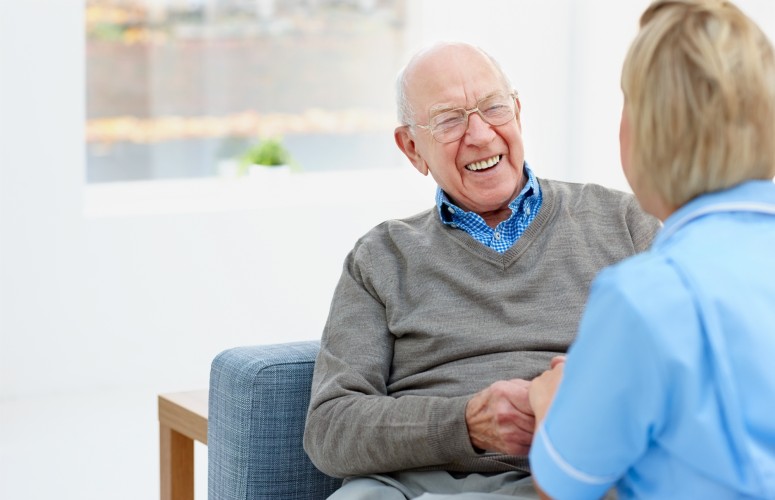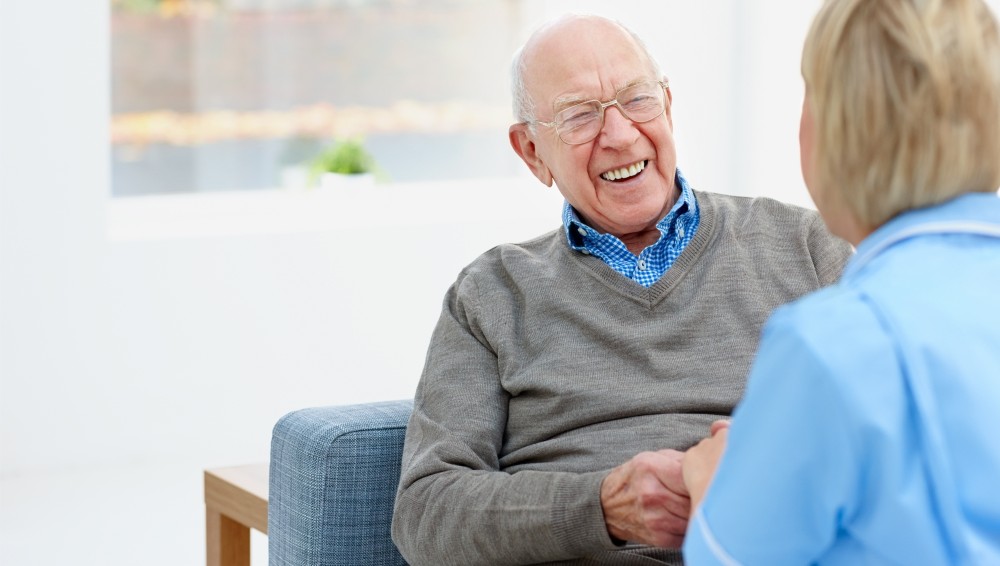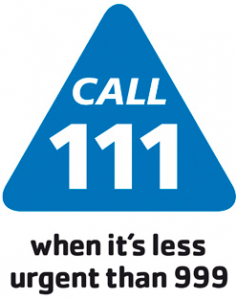The Health and Social Care Act 2008 states that all registered providers must provide adequate infection prevention and control arrangements. This will ensure residents are cared for in a safe and clean environment where the risks of healthcare associated infections are minimised.
Resources
What you need to know about C.diff
All health care providers in Leeds are committed to reducing C.diff infection.
Find information below about C.diff and the steps you can take to protect yourself.
What is C.diff?
Lots of different bacteria live naturally in the gut. In about 3% of healthy adults this includes C.diff. It rarely causes any problems in healthy people.
When does C.diff cause a problem?
C.diff only causes a problem when something alters the natural balance of germs in the gut causing the body’s defences to become weakened. Antibiotics used to treat other illnesses can sometimes cause this which then allows C.diff germs to increase causing irritation of the bowel.
If you are prescribed antibiotics always follow instructions from your doctor.
How is C.diff spread?
C.diff can be spread by direct contact with an infected person, or by touching a surface that has C.diff germs (spores) on it.
A person with C.diff infection releases germs (spores) into the environment when they go to the toilet. These germs can live for months and can be picked up on hands and surfaces causing spread of the infection.
This is why it is so important to thoroughly wash your hands with soap and water, particularly before you eat. Do not use alcohol hand-rub if you have C.diff or live with or care for someone with C.diff, as it is not effective against C.diff germs. To remove them you must wash your hands.
How can I help stop the spread of C.diff?
- Keep your hands clean.
- Always wash your hands with soap and water after using the toilet.
- Always wash your hands, or clean them with a wipe, before and after a meal.
- Clean and dry surfaces thoroughly, especially those frequently touched (e.g. toilet flush handle, taps, door handles).
- Wash soiled clothing separately as soon as you can in a high temperature.
What can I do about C.diff if I am a community in-patient?
- Let staff know if you have diarrhoea so they can identify a toilet for you to use.
- Always wash your hands after using the toilet.
- Keep your hands and body clean.
- Always ask staff to wash their hands before they touch you.
- Always wash your hands, or clean them with a wipe, before and after eating.
- It is important that all visitors clean their hands using soap and water before and after visiting.
- Let staff know if the toilet area is dirty.
- Keep the bed area and locker clear of clutter so it can be cleaned easily.
- Cover any food, fruit or sweets you may have at your bedside and do not share them.
It is everybody’s responsibility to take these simple steps.
How will I know if I have C.diff?
Symptoms of C.diff infection include diarrhoea, blood in your poo, stomach pains, loss of appetite, fever and sometimes feeling sick. You will know you have C.diff if a sample of your poo tests positive. You will be given a C.diff card if you have the infection.
How is a C.diff infection treated?
You may be given an antibiotic that treats the C.diff infection. Any other antibiotics that you are on may be stopped.
If you are a community in-patient and have a C.diff infection you may be moved into a single room to reduce the risk of spreading it to other people. It is very important to avoid becoming dehydrated, so drink plenty of fluids.
Will it affect my family and friends?
C.diff is infectious and can be harmful to some people such as those with serious health problems. C.diff should not harm healthy people, including pregnant women, children, or babies.
Can I go home from a community in-patient area if I have C.diff?
As soon as you are well enough you will be able to go home. Having C.diff should not stop this. Your healthcare professional will give you any information or advice you need.
Notify influenza outbreaks (which is 2 or more staff/residents affected) to the local Public Health England Center: 0113 3860300
Antimicrobial Stewardship and Antibiotic Guardianship in care homes
What is antimicrobial resistance?
Microbes are tiny living organisms. Some are harmful to health which includes bacteria, viruses and fungi etc. Antimicrobials are agents such as antibiotics which prevent or clear up infections caused by microbes However as part of their natural development microbes become resistant to antimicrobials. The more antimicrobials are used the quicker resistance develops. Already many bacteria are resistant to several antibiotics and some are resistance to the antibiotics which are used as a last resort. Multi-resistant infections are more likely to be difficult to treat, more serious and can be life threatening.
What is being done to develop new antibiotics?
Not enough research and development is being done to produce enough new antibiotics to match the growing rate of resistance. This means eventually we may not have enough effective antibiotics to treat infections that we would currently expect to eliminate.
What can care home staff do to help reduce antimicrobial resistance?
It is important that staff act as stewards and guardians and ensure that:
- all antimicrobials are only used wisely and appropriately in their care home
- they implement good infection prevention and control practice. This includes hand hygiene which is one of the most effective ways to reduce infections, reduce the need for antimicrobials, and reduces antimicrobial resistance
When should care home staff perform hand hygiene?
- Before touching a resident
- After touching a resident
- Before a clean procedure
- After a dirty procedure
- After coming away from the resident’s environment
How can staff ensure antibiotics are used appropriately in their care home?
Staff should ensure that:
- they work together with the GP to ensure that residents only receive antibiotics when they have signs and symptoms of an infection and that antibiotics are not give for just in case
- after a resident has been diagnosed with an infection samples are obtained (if possible) before the resident starts antibiotics. Samples help determine which antibiotics should be prescribed and helps prevent the wrong antibiotics being prescribed.
- prescribed antibiotics are commenced promptly, administered exactly as prescribed and the full course is completed. Resistance may develop if only part of the course is administered.
Why are care home residents more vulnerable to infections and to multi-resistant infections?
Care home residents are likely to be elderly and/or have health conditions which increase their risk of developing infections and more serious infections. Residents are also likely to have had several courses of antibiotics. This increases their risk of carrying multi-resistant organisms which may develop into
multi-resistant infections. Communal living in care homes further increases the risk of residents becoming colonised or infected with multi-resistant organisms. Antimicrobial stewardship and antibiotic guardianship is one of the most effective interventions in protecting residents and in reducing antimicrobial resistance.
Where can I find more information?
Public Health England – Antimicrobial Resistance Resource Handbook contains an updated list of current national policy, guidance and supporting materials on antimicrobial resistance and infection prevention and control.
MRSA treatment
What will this treatment be?
If you have been told you are MRSA positive, you may be prescribed a skin decolonisation treatment. This will consist of an antibacterial ointment which is applied up your nose and an antibacterial body wash. This is a simple treatment to reduce or get rid of as much of the MRSA bacteria from your skin as possible.
If you have any allergies to any of the ingredients in the treatment please speak to your GP before using.
What do I need to do?
Always carefully read the instructions before using the treatment and ask your GP if you are unsure of anything.
The treatment should be used for either 5 or 10 days (your GP will indicate how long for). Always complete the full course of treatment.
If you have a planned hospital stay, you may be required to use the treatment for 5 or 10 days before you are admitted to the hospital. Inform the hospital staff if you have not completed your 5 or 10 day course when you arrive at the hospital.
This treatment can be carried out at home. Please speak to the healthcare professional who prescribed it if you are unable to apply the treatment yourself or if you have any cuts or wounds to your skin.
How do I apply the nasal ointment?
- Place a small amount (about the size of a matchstick head) on your little finger or a cotton bud
- Apply to the inside of both nostrils
- Press both sides of your nose together - this will help to spread the ointment
- Wash your hands thoroughly when finished
- Do this either 3 or 4 times a day, as prescribed.
How do I use the body wash / shampoo solution?
It is best to use the solution in a shower. If this is not possible the solution can be used in the bath.
- Wash your body once a day with the solution
- Wet your body before using the solution
- Put the solution on your hand, wash cloth or sponge
- Start washing at the top of your body and work your way down
- Wash all of your body with the solution, including the area around your nose, armpits and groin
- Do not put the solution inside your body and avoid your eyes and ears
- Try to leave the treatment on your skin for at least one minute before rinsing to allow it to work
- After washing, rinse off the solution thoroughly
- Dry your body with a clean towel
- Put on clean clothes every day during the treatment period if possible
Wash your hair with the solution twice during the treatment (preferably on the first day and the last day of treatment if possible).
For people who cannot get into a shower or bath, you may be prescribed skin treatment that is put on the skin and not rinsed off.
Speak to your Dr or nurse if you cannot get into a bath or shower.
Bed Linen and Clothing
We encourage you to change all your sheets, pillowcases and towels every day. If you can’t do this, please try to change them at least at the beginning and end of the treatment.
Will there be any side effects?
The treatment has few side effects even for people with sensitive skin or eczema. However if you:
- develop a rash or sore skin
- or if you have eczema and it gets worse
then please STOP the treatment and contact the the healthcare professional who prescribed the treatment for further advice. You may need to be given a different product to use.
If you need advice out of hours please call NHS 111.
Family and friends
MRSA is not normally a problem for healthy people, including family members, or visitors. MRSA cannot harm pregnant women, children or babies providing they are fit and healthy. So you can still continue with your normal daily and social activities.
Make sure that you use your own towel - do not share it with others. Remember to encourage your family and friends to wash their hands frequently.
While MRSA can be passed from person to person it is not a risk to healthy people and is unlikely to be a problem in the home or at work.
MRSA Patient Information
What you need to know about MRSA
All health care providers in Leeds are committed to reducing MRSA infection. This leaflet contains information about MRSA and the steps people can take to protect themselves.
What is MRSA?
MRSA stands for Meticillin resistant Staphylococcus aureus which is a type of bacteria (germ). It means the bacteria Staphyloccocus aureus has become resistant to Meticillin; a type of antibiotic. MRSA, like all germs, can live harmlessly on your body but if they get in the wrong place such as a cut or wound, they may cause infection. It can also live in dust for short periods. We treat some infections with antibiotics, however, in some cases MRSA may be difficult to treat as not all antibiotics work properly against it.
Who can get MRSA?
Anyone can have MRSA, it does not normally cause harm to healthy people and is usually carried on the skin. When you are ill your body defences can be weakened and this can make it easier for MRSA to cause infection.
How is it spread?
MRSA can be spread easily by hands and by equipment that a person with MRSA has used if it has not been effectively cleaned.
How can we prevent the spread of MRSA?
It is everyone’s responsibility to take these simple steps:
- Careful hand cleaning by healthcare staff and patients.
- Cleaning of equipment used by healthcare staff which is used by other patients.
- Effective use of skin decolonisation treatment.
- Try not to touch wounds, drips, catheters and other tubes.
If you are in hospital and have MRSA, your bed may be moved to a single room. It is important that all visitors clean their hands with either liquid soap and water or hand sanitiser before and after visiting.
How will I know if I have MRSA?
People who carry MRSA do not always know and do not look or feel any different. You may have swabs taken if a healthcare professional thinks you have an infection or if you are going into hospital. The swabs are usually taken from your nose, groin and armpit and from any wounds or open areas on your skin. If you are found to have MRSA on your skin, you may be prescribed a nasal ointment and body wash treatment called decolonisation treatment.
Will it affect my family and friends?
MRSA is not normally a problem for healthy people, including family members or visitors. MRSA can not usually harm pregnant women, children or babies providing they are fit and well. However, it is important to always maintain good hygiene practice, particularly hand cleaning.
How is MRSA treated?
Treatment for MRSA is not always needed. If MRSA is causing an infection and you are unwell, you will be given antibiotics that work against MRSA and skin decolonisation treatment (body wash and nasal ointment). It is very important that you take the full course of antibiotics prescribed.
E.coli Information for patients
What is E. coli?
Escherichia Coli (E. coli) is a bacteria that can be found in the bowel of most people. E. coli does not cause any problems when it’s there, but can cause infections if it gets in to new areas such as cuts, scratches or urinary catheter sites. An E. coli infection can cause serious illness which will need medical treatment.
How is E. coli spread?
E. coli is excreted from the body in faeces. If you do not wash your hands properly after going to the toilet the bacteria can spread around the house and across your body via your hands. If the bacteria is spread to wounds or scratches, catheter sites or other open passages it could cause an infection. You can also infect others when you touch them or if they touch a surface you have spread the bacteria to.
Who is at risk?
Anyone can pick up an E. coli infection, and this is usually self transmitted (caused by the bugs in your bowel). However, you are more at risk of an E. coli infection if you:
- Are an older person
- Have diabetes
- Become dehydrated
- Have a urinary catheter
- Have an intravenous device (PICC or Hickman Line - you’ll know what these are if you have one)
- Have gallbladder or kidney stones
- Have an enlarged prostate or other prostate problems.
What are the signs and symptoms of E. coli infections?
Symptoms of and E. coli infection can be different depending on where the infection is. If the E. coli has entered your blood and caused a blood stream infection (bacteraemia) some of the main symptoms are: a very high temperature, shivers and chills, not passing urine all day, being more confused than usual, and your symptoms not getting better or getting worse within two days of starting antibiotics. Bacteraemia can only be diagnosed through a blood test.
How is E. coli treated?
If your doctor or nurse thinks you may have an E. coli infection they will take a sample from the infection area (e.g. urine sample, wound swab). You many be then prescribed antibiotics to treat the infection.
Can the infection come back?
E. coli lives quite normally in your bowel so it is impossible to get rid of it completely. However, if E. coli spreads to another area and infects it, you may need antibiotics to treat it. Having an E. coli infection does not give you immunity, so if it gets into an area where it should not be again, you may need more treatment.
Remember: Always complete the antibiotic course you are given. If you do not complete the course, the infection may not have completely cleared, could come back and the antibiotic may not work.
How can E. coli infections be prevented?
E. coli infections cannot always be completely prevented, however, you can reduce the risk of getting an infection by:
- Washing your hands after using the toilet
- Washing your hands before preparing and eating food
- Washing your hands before touching a catheter or changing the bag
- Not touching catheters, Intravenous lines or open wounds unnecessarily
- Women should wipe front to back after going to the toilet
- Keeping hydrated. Drink plenty of fluid each day.
E.coli - a guide to staying hydrated
The facts
- Your body is 60% water.
- Dehydration happens when your body loses more water (e.g. through sweating or passing urine etc.) than you take in.
- 1.5 litres of water is removed from your body every day as urine.
- For every alcoholic drink you consume you urinate around 100mls more of additional urine, as well as the amount you drink. So if you have 10 alcoholic drinks you will have lost an extra litre of water!
- Dehydration can affect your brain function and prolonged dehydration can lead to short term memory loss and heat stroke in the warmer months.
- Dehydration can cause E. coli infections such as urine (water) infections.
- To prevent dehydration, you should drink 8 glasses or cups (2 litres) of fluid daily.
- You should drink more than 8 glasses (or cups) a day if it is hot or you are exercising.
- Babies, children and older adults are more at risk of becoming dehydrated.
- You are more at risk of dehydration if you have diarrhoea, vomited or have drunk too much alcohol.
- Certain watery fruits and salad items (watermelon, cucumber, citrus fruits, berries, tomatoes etc) as well as some foods such as yoghurts, soup, ice cream/ lollies and jelly contain water.
The symptoms of dehydration
- Feeling dry or thirsty.
- Dark coloured, strong smelling urine.
- Feeling dizzy or tired.
- Not passing much urine in the day.
- Constipation.
- Confusion or more confused than usual for those with dementia.
- Dry mouth and lips.
- Headaches.
The solutions
- Be aware of the extra water you lose when drinking alcohol. For every alcoholic drink you consume, have a soft or non-alcoholic drink in-between to stay hydrated and prevent a bad hangover!
- Make sure you have a bottle of water on hand when you are exercising.
- Drinks that are great at keeping you hydrated include: water, squash, fruit juice, smoothies, herbal tea, milk etc. Drinking tea and coffee are great ways of keeping you hydrated but best to stick to decaffeinated.
- Keep hydrated in warmer weather, drink plenty!
Infection Prevention and Control Team
Tel: 0113 843 4511
infectioncontrolleeds@nhs.net
Please note that due to the due to the COVID-19 outbreak the team will not be able to respond to all questions or may be much slower to respond. Thank you for your understanding.
We are currently reviewing our website to make all content accessible. If you are looking for a download, such as a leaflet or booklet that you can no longer find, please contact the service on the details above.
COVID-19
Please liaise with the local Public Health England Centre as soon as possible via 0113 386 0300 if you suspect or have a COVID-19 outbreak (2 or more affected staff or residents) or your care home does not have a current COVID19 outbreak but you have a single suspected or confirmed COVID19 staff or resident.
____________________________
- COVID-19 Admission and care of people in care homes
- Personal protective equipment (PPE)– resource for care workers working in care homes during sustained COVID-19 transmission in England
- Visits outside of the care home guidance
- Visiting care homes guidance
- Coronavirus (COVID-19) testing in adult care homes




